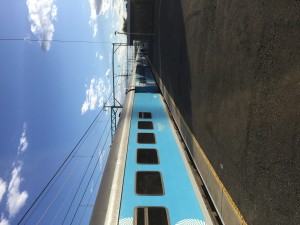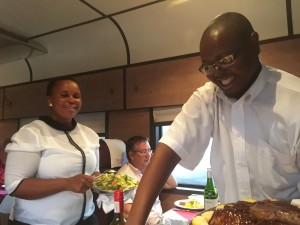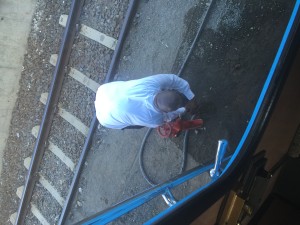SLOW TRAIN A-RUNNING
It’s Tuesday morning and I’m on the Prasa Group Premier Classe train from Cape Town to Johannesburg .
It’s a trip just shy of two thousand kilometers, and it takes twenty-seven hours. Or it did until minutes ago, when the Assistant Train Manager Casper Groenewald informs us that, due to problems with signaling, we will be delayed by three hours.
To put the journey into context, you can drive between the two cities in around thirteen hours and fly there in a tad over two, so why on earth have I chosen a mode of travel that takes so long?
Other than the fact that I avoid flying whenever possible — a sentiment exacerbated by my
recent BA experience from Heathrow the Cape Town — the Premier train is a throwback, a relic from a distant era, an epoch when travel was stylish and the journey more important than getting there.
To travel in opulence was more important than to arrive.
But make no mistake, if you have a deadline to meet in Jo’burg. This mode of transport is not for you.
Groenewald is the man in charge of proceedings. Tall, and as full-bodied as a good Pinotage, genial but in an authoritative way, he is a true railway man. For looks and mannerisms, think Gene Hackman.
And whereas Virgin Rail bombards you with mostly irrelevant information over the intercom, Groenewald personally informs all 77 passengers, either individually or in small groups, of any departures to the schedule.
And to provide this service, he has to travel the length of the train, around six hundred metres and visit all eighteen carriages attached to the electric locomotive pulling us lugubriously towards Jo’burg.
We leave Cape Town shortly after 9.15 on Tuesday morning, luggage having been delivered to our couchettes. We are invited to the dining carriages where we are introduced to the staff that will look after us and told that where we are sitting is where we will be seated for every subsequent meal.
I’m opposite Jill from Droitwich and her sister Sue, who moved out to Jo’burg over thirty years ago. Next to me is John, a retired bank manager who is travelling with Robert, a guitarist wearing retro Oakley’s who is at death’s door with man-flu.
We are treated to a glass of champagne, and a plate loaded with a curious selection of nuts and dried meats, and Groenewald aka Gene, tells how the next twenty-seven hours will play out.
Lunch will be at 12 precisely; high tea at 4, dinner at 7 and tomorrow’s breakfast will be available between seven and nine.
Now, a bit about the train.
As I’ve said, it is made up of eighteen carriages. Some are sleeping compartments, doubles or as in my case, singles. Each carriage has a toilet and a reasonably sized shower compartment; the train has two restaurant cars, one kitchen and one smoking and one non-smoking lounge.
After lunch, I get a chance to sit down in the non-smoking lounge for a coffee and a chat with Groenewald who tells me the capacity is 100 so today we are running on the light side.
There are nineteen staff that cook, serve, man the bar, clean, prepare our beds for sleeping,
and, of course drive the train. Six drivers work shifts of up to six hours in pairs. When we reach Jo’burg, all have a day off then return to Cape Town on Friday.
Prasa, Groenewald tells me, is a large international rail company and they don’t always get things right. So, for example, when they bought a load of Spanish rolling stock for around R40m, they didn’t bother to check the height. It only takes one tunnel to be too low on a two thousand-kilometre journey to render the investment totally useless.
They also — and here I’m reminded of good old British Rail — he says, never actually complete a project. For example, there is a large plasma TV in each lounge… but it’s not connected up to anything. Ditto Wi-Fi.
Prasa offer three levels of travel: Premier, Deluxe and Economy Sleeper. I paid R3470 (by today’s rate equivalent to £150). Economy sleeper costs around twenty per cent of this but is basic. Prepare to share a sleeping cabin with a complete stranger.
Lunch commences with a fish course, followed by Chicken Cordon Bleu and cheesecake for desert. It’s silver service, all very professional.
I consume half a bottle of a decent Sauvignon Blanc as we say goodbye to Table Mountain, pass through the wine growing regions and head for the wilderness north-west towards Jo’burg.
To describe the scenery between lunch and dinner as drab is something of an understatement. The land flattens out and scrubland turns to wasteland, unsuitable even for subsistence farming.
I sit in the lounge and chat with John and Robert. Most of my fellow-travellers are here for the cricket. Next to us a card school is under way and on my other side a large gathering of colourful black people drink red wine and party noisily. We are all here for a good time.
Dinner commences with vegetable soup, is followed by steak with a peppercorn sauce, then Black Forest Gateau and is rounded off with cheese and biscuits.
The bar in the lounge carriage closes at ten but that’s immaterial to me as I’m snuggled up in my turned-down couchette by 9.45.
Our route takes us though Worcester, where we stop in the mid-afternoon furnace to take on ice and water — but no hand towels for the toilets — and to stretch our legs.
We have a longer stop at Beaufort West as the early evening sun begins to lose its venom, and our final halt is at Kimberley at 3am. The squealing of the brakes wakens me and I feel the welcome cool of the dead of night air caress my face through my open window
Sleep, for me, like the air con, is intermittent at best and I finally concede defeat around six am and open my blind to see that we are still lolloping along through arid scrubland. There are no habitations in view, just this barren scorched-earth wilderness.
We average, according to Groenewald, around ninety kilometres per hour but our pace is often funereal.
Long chunks of the journey run parallel to major roads. Traffic is light but it is not uncommon for articulated lorries to rumble past us.
Breakfast is a rolling feast of cereal, bacon and eggs served between seven and nine, but by midday I’m starving, and with the news that our ETA is now approximately 14.30, I’m wishing that I delayed my visit to the breakfast carriage.
Although the food is excellent, one criticism is that there are no snacks or hot drinks available. The bar service is intermittent as the barman appears to have other duties peripheral to spending a large amount of time on his phone.
The alternative to the Premier Classe is the Blue Train, but at around R25,000 for the trip it’s a hefty upgrade, although it is purported to rival the Orient Express for its opulence.
It’s around midday when Groenewald announces that because of our delay we will be treated to ‘hot snacks’ so it’s back to our stations in the dining car for one last time.
An eclectic selection of mostly hot food is served: tiny one-bite toasted sandwiches, samosas, quiche and cake. In fact, appropriately, a bit of a cricket tea.
Huge townships where the poor live roll into view on our left and to our right are the brick-built buildings of their white, more affluent neighbours. We pass Soweto, the biggest township in South Africa, which is an urban area of Johannesburg in the province of Gauteng, bordering the city’s mining belt in the south. Its name is an abbreviation for South Western Townships.
‘Soweto ‘the official website informs me, ‘is a symbol of the New South Africa, caught between old squatter misery and new prosperity, squalor and an upbeat lifestyle, it’s a vibrant city which still openly bears the scars of the Apartheid past and yet shows what’s possible in the New South Africa.’
14.35 and we eventually roll into Jo’burg. I manage to contact my hotel and they send a driver for me. Outside the Premier Lounge is a guard holding an AK47, the weapon of choice for terrorists, insurgents and now, it appears, security guards.
The Slow Train A-Running has finally arrived. Now for the cricket.








